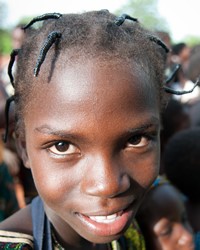The Wara live in six villages among the hills that form the southwestern border between Burkina Faso and Mali. To an outsider, the region is quite striking in the ruggedness of its landscape and its relative lushness, resulting from a fairly large annual rainfall.
Concerning Wara lifestyle, their chief occupation is subsistence farming. Any cash they earn comes from the sale of surplus crops of corn and rice.
The Wara have closely knit extended families. The eldest male of a clan acts as the family chief; his wife, children, and grandchildren must submit to his authority. While the Wara seem to value their isolation, that isolation keeps away any benefits from development.
In a region of the country that has seen much religious and social change, the Wara cling to their traditions. This includes the religious domain. Unlike various neighbors who have succumbed to Islam, the Wara continue to follow their traditional religion. According to this worldview, spirits control health and nature; sacrifices are the means to keeping peace with the spirits. At the present moment, the only Christian presence is a Catholic church in one Wara village.
There are no modern health care facilities in any Wara village, therefore malnutrition and health care problems brought about by contaminated water go untreated. Furthermore, only two Wara villages have schools - the rate of attendance among the Wara children is less than 30%.
Pray the hearts of the Wara people would be stirred to hunger after God, to drink of living water.
Pray for family-based movements to Christ to soon transform Wara society, blessing them spiritually and economically.
Pray for the Lord to move in the hearts of local believers to give up their own rights and sacrifice their lives to see the Wara people blessed by the work of Jesus Christ, the only savior.
Scripture Prayers for the Wara in Burkina Faso.
| Profile Source: Joshua Project |










